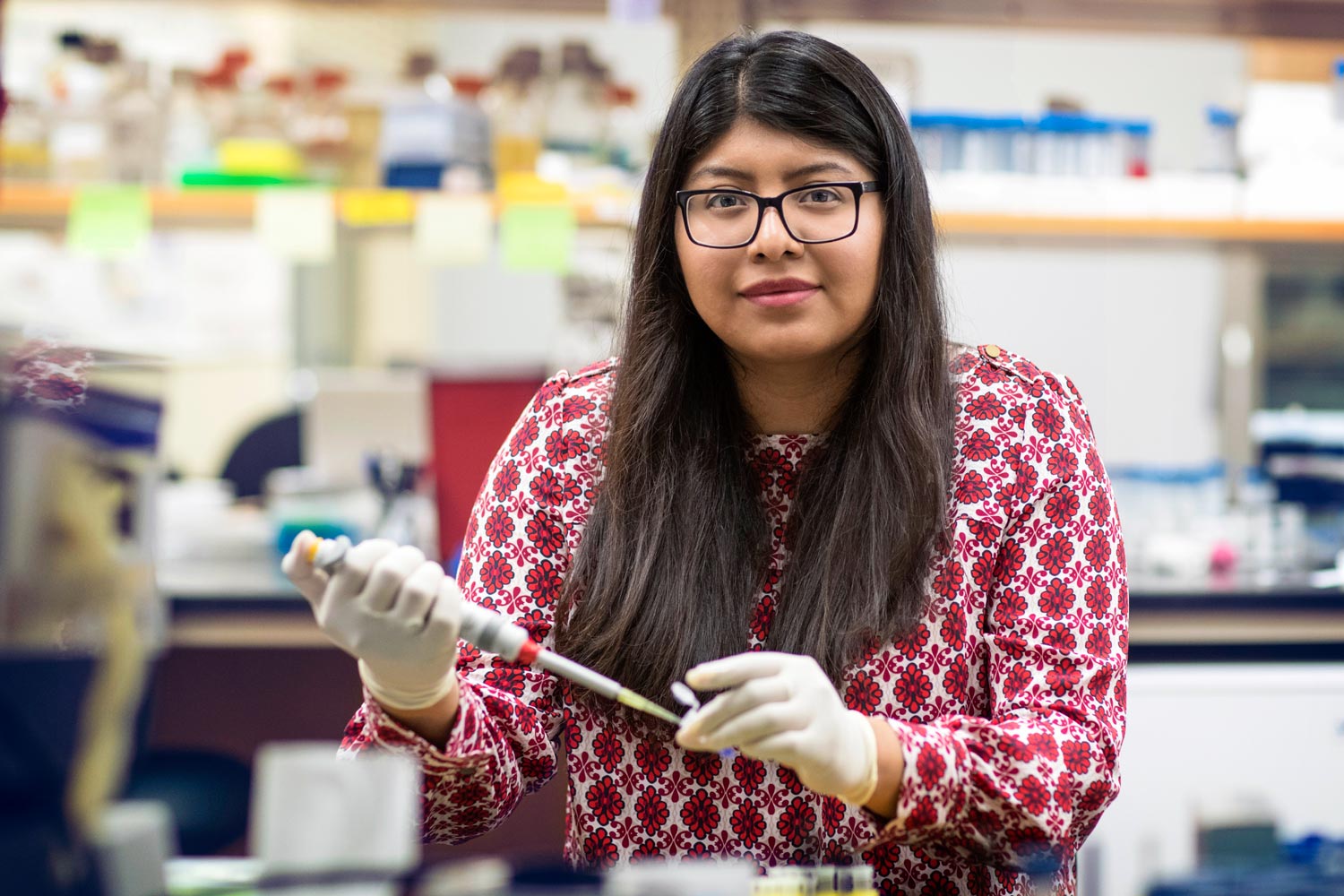Samantha Melinda Perez wants to blend her biomedical engineering skills in fighting pancreatic cancer with public policy to create a healthier society.
The Robert Wood Johnson Foundation named Perez, a University of Virginia graduate student, a Health Policy Research Scholar, which will provide her with $30,000 annually for up to four years. She is one of two students who are the first engineers to be named Health Policy Research Scholars.
Perez, of Los Angeles, a second-year biomedical engineering graduate student in the School of Engineering and Applied Science, focuses her research on pancreatic ductal adenocarcinoma, the most common form of pancreatic cancer, which has a 7 percent five-year survival rate. She specializes in characterizing the role of extracellular plectin-1, a robust biomarker for the disease, in extracellular and intracellular signaling in order to help develop novel diagnostic and treatment modalities.
She said she is concerned about how her work in the laboratory is applied to fight against cancer, and that is why she is pursuing the policy aspects.
“My research has the potential to lead to future advancements in early diagnosis and treatment of pancreatic ductal adenocarcinoma,” she said. “Consequently, I am highly interested in partnering with health care providers and policymakers to make sure these future treatments will be accessible to all communities, regardless of socio-economic status.”
Perez said cancer health disparities are prevalent in racial and ethnic minorities for a variety of reasons, such as increased incidence and the stage of the cancer at diagnosis, as well as differences in receipt of treatment.
“I wish to use my knowledge and research to develop strategies and influence policy that increases receipt of exceptional cancer treatment for all patients,” she said. “No discipline alone can solve the cancer health problem; it needs to be a collaborative effort and I wish to be at the forefront of that effort.”
Perez said she applied for the Health Policy Research Scholars Program because the program is bringing together a diverse group of doctoral students, from a wide variety of research fields, to foster a cross-collaboration that will influence policy.
“I applied because I want to partner with and learn from individuals in other sectors about how to streamline my research to maximize its impact, develop policies that foster the development of novel treatments, and train other biomedical professionals from diverse backgrounds about health disparities,” Perez said.
She wants to use her biomedical-based research to diversify the health-care conversation and aid in advancing health equity. She is also driven in this research.
“I find this project very exciting and innovative,” she said. “My adviser, Kimberly Kelly, discovered that plectin is abnormally expressed on the surface of [pancreatic ductal adenocarcinoma] cells while remaining solely cytoplasmic in healthy cells. However, much is still unknown about why this mislocalization occurs and how it impacts cell signaling.”
She is now working to better understand this phenomenon.
“Beyond contributing to the science and medical knowledge base, it is highly motivating to know that this project has high potential to benefit society and contribute to the achievement of increasing the [pancreatic ductal adenocarcinoma] cancer survival rate,” she said.
“Samantha is a serious and diligent student who jumped into her project and quickly owned it,” said Kelly, a professor of biomedical engineering. “She is naturally intelligent which is furthered by her focus, hard work and determination.”
Perez’s specific career plans are indistinct at this point, but she wants to use her skillset to build healthier communities and advance health equity either in a laboratory or policy setting.

“I envision myself working in the public health or policy sector, using my engineering background and unique perspective to create innovative solutions that will enable everyone to live longer, healthier lives,” she said. “I aim to diversify the health-care conversation and aid in advancing health equity.”
Perez is looking forward to expanding her experience in the laboratory and in policy settings.
“With the [Health Policy Research Scholar] program’s support and mentorship, I will gain the necessary knowledge, leadership skills and professional ties needed to create positive change,” she said. “Additionally, the $120,000 in funds will help support my successful concurrent completion of the Health Policy Research Scholars Program and a Ph.D. in biomedical engineering at UVA.”
Perez’s background has helped shape what she is today and what she wants to do.
“Initially, my desire to affect change stemmed from growing up acutely aware of the inequalities in education, health and accessibility that plagued my northeast Los Angeles neighborhood,” she said. “However, it has been the intersection of my identity as a female Mexican-American from an urban, low-income neighborhood that has ultimately motivated me to pursue research as a path to helping all those with similar backgrounds and identities.”
Perez received a Bachelor of Science in engineering from Duke University in 2015, and is a 2011 graduate of the Marlborough School in Los Angeles. At UVA, she is the outreach co-chair of the Graduate Engineering Student Council, co-president of the Latinx Graduate Student Alliance, a member of the BME Graduate Student Diversity Committee, and has been a “Day in the Life” tutor and a tutor at the Boys and Girls Club.
Health Policy Research Scholars is a leadership development opportunity for second-year, full-time doctoral students from underrepresented populations and/or disadvantaged backgrounds who can bring unique and diverse perspectives to their research as they help advance health and equity. The Health Policy Research Scholars program includes scholars from psychology, architecture, transportation, sociology, social welfare, environmental health and other disciplines.
Media Contact
Article Information
October 18, 2017
/content/major-scholarship-help-grad-student-translate-lab-results-health-policy

